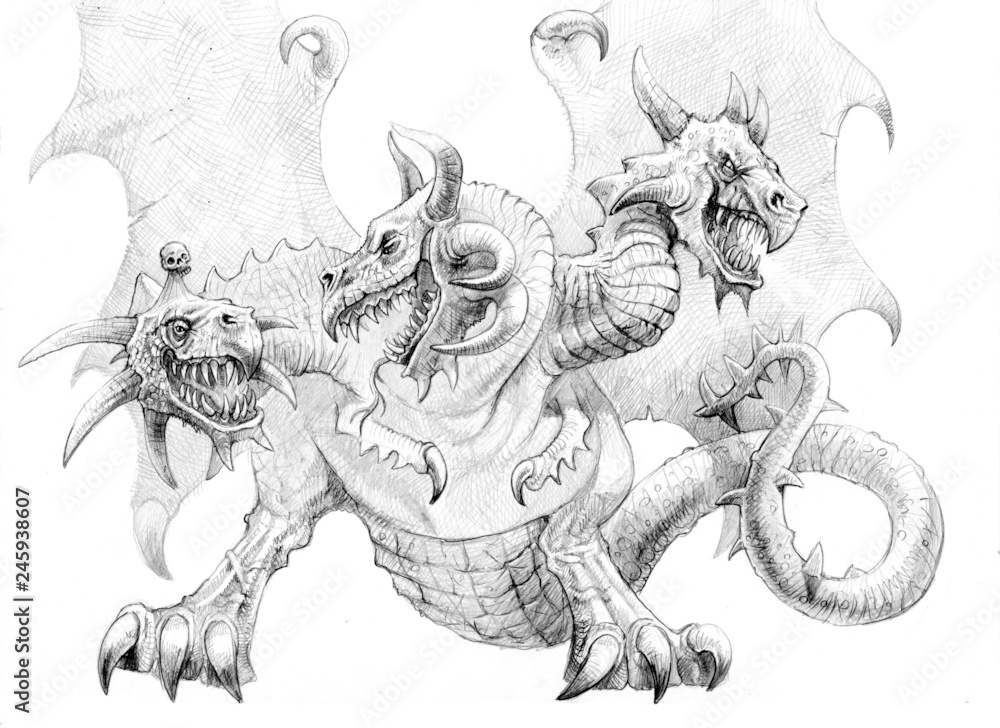The Enduring Allure of Three-Headed Dragon Art
From the dawn of human imagination, dragons have captivated our collective consciousness, their serpentine forms and fiery breath woven into the tapestry of myths and legends across cultures. But within this rich draconian tapestry, the three-headed dragon holds a particularly compelling place, its triplicate nature suggesting a complex symbolism ripe for artistic exploration.
What is it about the three-headed dragon that so enchants artists and storytellers alike? Perhaps it's the inherent paradox: a single creature embodying multiplicity, a symbol of chaos yet also of potent, tripartite power. The three heads can represent different aspects of a single force, or perhaps conflicting forces held in uneasy balance. This inherent ambiguity allows for diverse interpretations in three-headed dragon art, making it a continually evolving and fascinating subject.
The roots of three-headed dragon imagery can be traced back to ancient mythology. The Hydra of Greek legend, though possessing more than three heads, embodies a similar concept of monstrous multiplicity and regenerative power. Similarly, the Slavic Zmey Gorynych, a formidable three-headed dragon, represents a powerful force of nature, both destructive and life-giving. These early depictions laid the groundwork for the three-headed dragon's continued presence in art throughout history.
The significance of the three-headed dragon varies across cultures and time periods. In some contexts, it represents chaos and destruction, a force to be feared and vanquished. In others, it symbolizes strength, wisdom, and magical potency. The three heads can be interpreted as representing the past, present, and future, or the elements of earth, air, and fire. This fluidity of meaning allows artists to imbue their three-headed dragon depictions with rich layers of symbolism.
Throughout history, depictions of three-headed dragons in art have served as a reflection of the cultural and social anxieties of their time. From illuminated manuscripts to modern fantasy illustrations, these fearsome yet captivating creatures offer a lens through which to examine our relationship with power, fear, and the unknown. Their enduring presence in art speaks to a deeper human fascination with the multifaceted nature of existence.
Creating compelling three-headed dragon art presents unique challenges. Balancing the three heads to create a cohesive and dynamic composition requires careful consideration of proportion and perspective. The artist must also decide how to depict the dragon's personality and symbolic meaning through its posture, expression, and surrounding environment.
One can find inspiration for three-headed dragon artwork from a variety of sources. Ancient mythology, medieval bestiaries, and modern fantasy literature all offer rich visual and narrative material. Observing real-world reptiles and studying their anatomy can also help artists create more realistic and believable dragon depictions. Exploring different art styles, from traditional painting to digital illustration, can further expand the creative possibilities.
The modern resurgence of interest in fantasy and mythological creatures has led to a renewed appreciation for three-headed dragon art. Contemporary artists are exploring new ways to interpret this classic motif, incorporating elements of surrealism, abstract art, and digital media to create truly unique and captivating pieces.
Advantages and Disadvantages of Three-Headed Dragon Art as a Subject
| Advantages | Disadvantages |
|---|---|
| Rich symbolism and potential for diverse interpretations | Can be complex and challenging to depict convincingly |
| Connects with a long and fascinating history of mythology and folklore | Risk of falling into cliché or derivative representations |
| Appeals to a wide audience interested in fantasy and mythical creatures | Balancing the three heads visually can be difficult |
Frequently Asked Questions about Three-Headed Dragon Art:
1. What does the three-headed dragon symbolize? It can symbolize various concepts, including power, chaos, wisdom, and the passage of time.
2. Where can I find examples of three-headed dragon art? Art museums, online galleries, fantasy art books, and online art communities are good places to start.
3. How can I learn to draw a three-headed dragon? Practice drawing reptiles, study dragon anatomy, and experiment with different poses and perspectives.
4. What mediums are commonly used for three-headed dragon art? Painting, drawing, sculpture, digital art, and mixed media are all popular choices.
5. Are there any famous artists known for their three-headed dragon art? While there might not be artists solely dedicated to this subject, many fantasy artists have incorporated it in their works.
6. What are some tips for creating dynamic three-headed dragon art? Focus on dynamic posing, expressive details in the heads, and a compelling background.
7. How can I make my three-headed dragon art stand out? Develop a unique style, explore unconventional interpretations, and experiment with different mediums.
8. Where can I sell my three-headed dragon art? Online marketplaces, art galleries, and conventions are potential venues.
In conclusion, the three-headed dragon continues to ignite the artistic imagination, offering a canvas onto which we can project our fascination with myth, power, and the mysteries of the universe. From ancient cave paintings to modern digital illustrations, this potent symbol has endured, evolving alongside our understanding of the world around us. Whether viewed as a force of destruction or a symbol of profound wisdom, the three-headed dragon in art remains a testament to the enduring power of human creativity and our ongoing dialogue with the fantastic. Exploring this fascinating subject, either as a creator or an admirer, offers a rich and rewarding journey into the depths of human imagination and the enduring allure of the mythical.
Womens armband tattoos a unique form of self expression
Elevate your cake decorating printable rose cake toppers
Unlocking the arena the ultimate guide to beyblade burst turbo qr codes














